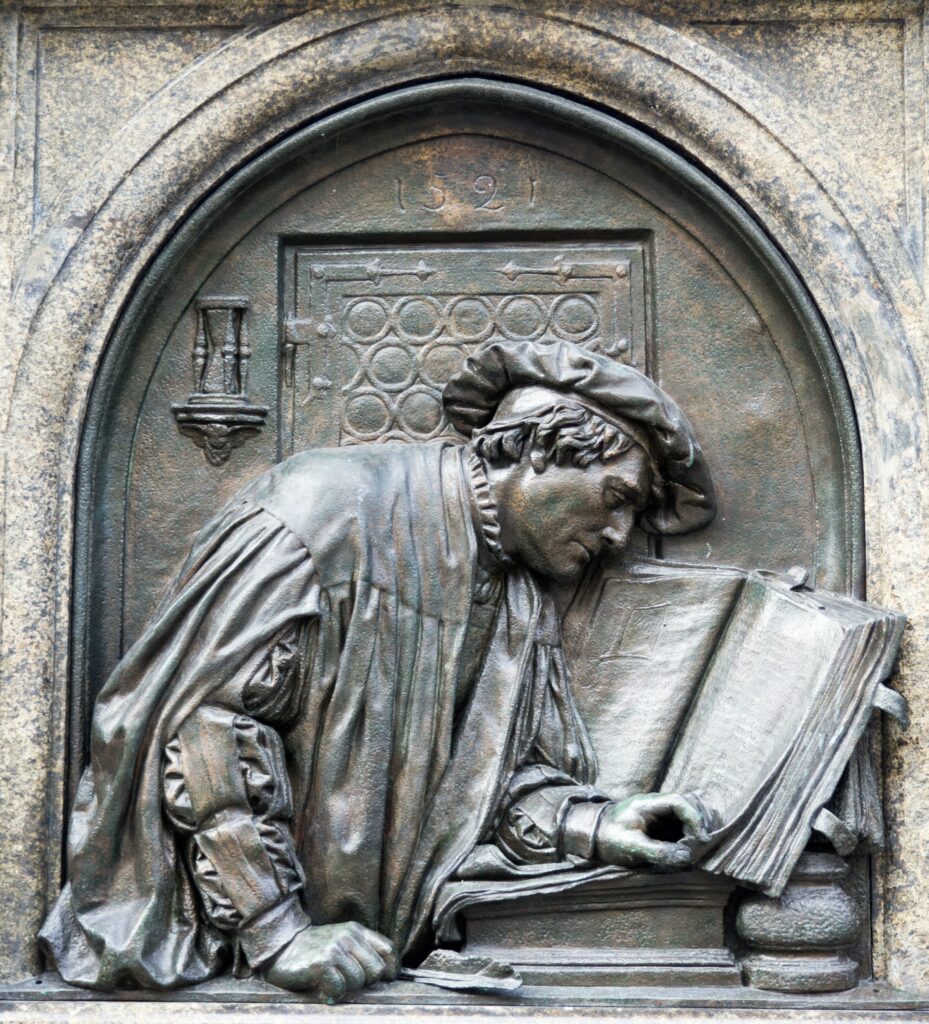
Tomorrow, October 31, is a landmark holiday in our culture: Halloween. But it is another holiday as well: it’s the anniversary of the day that the Reformer Martin Luther nailed his famous Ninety-Five Theses to the cathedral door in Wittenberg, Germany, an act viewed by many as the official start of the Protestant Reformation.
Some years ago I was asked to speak in my university’s chapel about the reasons for the Reformation. I’d like to take four posts to share what I presented there.
—–
The year is 1492. You live in central Europe, near the center of the Holy Roman Empire, in the area that will someday be called Germany. This is your life.
Your city, Frankfurt, is large, prosperous, and growing. It’s becoming a trade center, and the rich are developing fortunes. There are lots of people, but only two kinds, rich and poor. The rich own the land, and the poor live on it and do the best they can. There are lots more poor people than rich ones, so you’re poor. Your father is a cobbler; he makes shoes. And someday you’ll be a cobbler too, because that’s how life is; you work with your hands, and you learn a trade from someone willing to teach you, and your father is the closest teacher at hand. So you’ll be a cobbler, like him.
School? That’s funny. Hardly anyone goes to school. Oh, the children of rich people do—or at least some of them do, those who show some aptitude for learning. Many wealthy families want one of their sons to be a priest or a monk, and they’ll choose one to learn what he can in a monastery or an abbey. If the rich man is associated with the new banking industry here in northern Europe, his sons might learn to read and cipher so they can go into that. But you? No, school’s not in the cards. You’ll help your father in his shop, and you’ll learn his trade. You’ll make enough money at that to support a wife and children with food and other very basic needs.
Your schedule is pretty much ruled by the sun. When it rises, and the roosters crow, you get up, break your fast, and get to work. When it goes down, you fall into bed and sleep the deep sleep of the weary. Day after day, week after week, the ritual is the same.
Sometimes at night, when you can’t sleep, you look up at the sky. It’s quite a sight. There’s no light at night, of course, except the glimmer of a few torches here and there, and the night sky is a wonder. Thousands of stars—thousands of them—blanket the sky, with many of them clustered in a band. There are so many of them, and they are so close together, that it looks like a path of milk that stretches from the northeast to the south. A milky way. What a sight. And some of the stars are brighter than the others, and oddly, they change positions as the nights progress. People have given them names: Venus, Mars, Jupiter. You don’t know why they move among the other stars—the wise ones call them “wandering stars”—but you love to watch them parade along the Milky Way at night.
And you wonder who made them. God? Who is he? What is he like? Does he know about you? Does he care? Does he want to be friends? How can you find out?
There are churches in your town. The biggest one, St. Bartholomew’s, is right in the center of the city. It’s a very important church; the kings have been crowned there for more than 100 years, and everyone in the city is very proud of it. Its tower is almost 300 feet tall, and you can see it from anywhere in the city. It’s beautiful.
Your family goes to mass there on Sundays; your father says that you have to because God likes you better if you do. You think the mass is boring—it’s mostly in some language you can’t understand. It’s a long ways from where you sit to the front where the priest stands, but you can tell that he talks for a while—your father calls it a “homily”—and sometimes that’s in your language, but it’s so far away, and the church echoes so much, that it’s hard to make out much of what he says. Sometimes you hear him talking about giving alms to the poor, but you don’t have any alms. You guess that means you’re poor, but nobody ever gives your family any alms, either. And sometimes he talks about going on a pilgrimage to see holy places, but your father says there isn’t any money for that either, so the homilies don’t seem to say much to you. There’s a choir that sings in a kind of a chant, and you like that part, and then the priest says something in the other language, the one you don’t understand. It sounds like “hocus pocus,” and he holds something up with both his hands, and somebody rings a bell, and then everybody goes up to the front, row by row, for what your father calls the eucharist, but again, it’s all in a language you can’t understand, and when you ask your father to explain, he says he doesn’t really understand it either. You ask him to ask the priest, and he says he did, but the priest can’t read, so he can’t explain much. But it’s all very important, so your whole family goes every Sunday.
To be continued …
Photo by Wim van ‘t Einde on Unsplash

Leave a reply. Keep it clean.